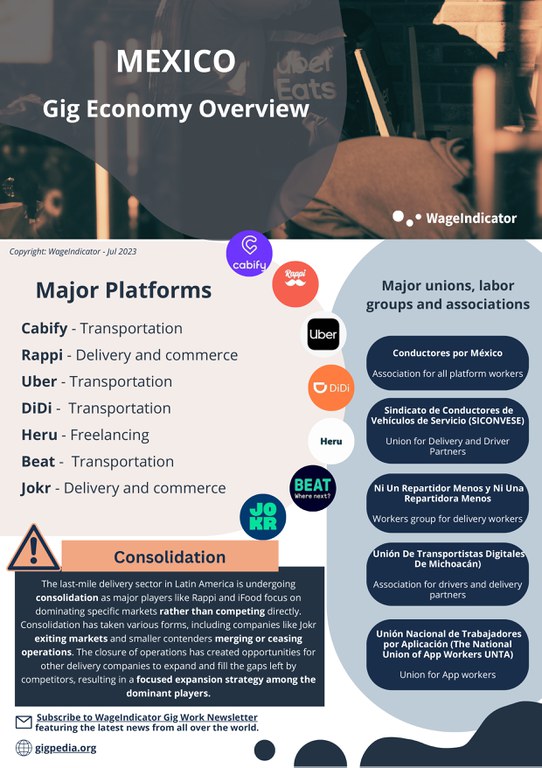TEXT FORMAT
MEXICO
Gig Economy Overview
Major Platforms
- Cabify - Transportation
- Rappi - Delivery and commerce
- Uber - Transportation
- DiDi - Transportation
- Heru - Freelancing
- Beat - Transportation
- Jokr - Delivery and commerce
Major unions, labor groups and associations
- Conductores por México - Association for all platform workers
- Sindicato de Conductores de Vehículos de Servicio (SICONVESE) - Union for Delivery and Driver Partners
- Ni Un Repartidor Menos y Ni Una Repartidora Menos - Workers group for delivery worker
- Unión De Transportistas Digitales De Michoacán - Association for drivers and delivery partners
- Unión Nacional de Trabajadores por Aplicación (The National Union of App Workers UNTA) - Union for App workers
Consolidation
The last-mile delivery sector in Latin America is undergoing consolidation as major players like Rappi and iFood focus on dominating specific markets rather than competing directly. Consolidation has taken various forms, including companies like Jokr exiting markets and smaller contenders merging or ceasing operations. The closure of operations has created opportunities for other delivery companies to expand and fill the gaps left by competitors, resulting in a focused expansion strategy among the dominant players.
What is the present legal status of gig workers in Mexico?
Gig workers are not classified as employees as most intermediary companies are registered as technological or digital platforms, not as contracting platforms. This implies that platforms can have users and clients without a labor obligation since it is considered technological intermediary.
Platforms use this legal loophole to exploit labor and treat
them as independent workers rather than employees.
According to the 2021 amendment of the Mexican labor law, employers are no longer permitted to subcontract or outsource personnel. They must now register with the STPS (Ministry of Labour). The law covers any individual or legal entity providing employees to be supervised and managed by a third-party client, and that determines the services and work to be rendered.
Minimum Floor Manifesto
Mexico is on its way to turning gig workers into full-time employees.
In September 2022, workers from 25 collectives presented the Minimum Floor Manifesto to the Ministry of Labor and Social Welfare, in which they included 10 points that must be integrated into the legislative proposal.
Platform workers are grouped in the collective "Conductores por México," which includes various organizations and unions, to become a federation.
The manifesto aims at establishing minimum wages in each sector; proving employer obligations; policies to combat sexual harassment and gender discrimination; policies to combat occupational risks; personal data protection; and joint vehicle registration and liability insurance.
The initiative to reform the Federal Labor Law is presently being discussed with companies.
Uber's Legal Victories in Quintana Roo: A Case Study
Case 1: Public Transport License Exemption
In a federal court in Cancún, two judges ruled in favor of Uber, stating that the company provides private transport and does not require a public transit license. This ruling aligned with a Jan 2021 Supreme Court decision recognizing the differences between Uber's business model and traditional public transport companies. Approximately 40,000 taxi drivers protested against Uber's potential operation without a public transportation concession.
Case 2: Mobility Law Exemption for Uber Eats
Uber Eats, the food delivery arm of Uber, won an injunction in June against the recently approved mobility law. This exemption relieved Uber Eats from the obligation to comply with a permit regime and pay 1.5% of the total cost of each trip, which was intended for the Mobility Fund of Quintana Roo. The consecutive wins for Uber created tension between gig workers of Uber and regular taxi and delivery workers.
Copyright: WageIndicator - Jul 2023
Subscribe to WageIndicator Gig Work Newsletter featuring the latest news from all over the world
Case 2: Mobility Law Exemption for Uber Eats


